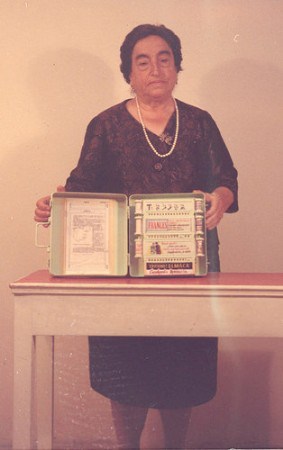“Ángela Ruiz Robles with her Mechanical Encylopedia”
by ITU Pictures / License: CC BY 2.0
As a distance learning provider, the NEC was founded on the aspiration to widen access to education. Doing things differently is part of our DNA and innovative thinking has been required from day one.
From looking at how new technology can enhance distance learning to exploring different pedagogical methods – innovation continues to drive us forward. Once in a while it we like to reflect on how others innovate in education – to see if there are lessons to be learnt.
Last week, an article in the Guardian highlighted how a street in Madrid has been named after Spanish teacher and inventor, Ángela Ruiz Robles. The street-naming celebrates her contribution to education and innovation in Spain. It is part of a wider initiative in Madrid to bring previously overlooked work by pioneering female artists, writers, scientists and thinkers to light.
Ruiz Robles is remembered for her 1949 invention: the mechanical encyclopedia which can be retrospectively viewed as a visionary forerunner to the ebook.
The mechanical encyclopedia was described as a “mechanical, electric and air-pressure driven method for reading books”. It included audio, a magnifying glass and a light – plus different subject reels that could be swapped out.
Born in 1895, Ruiz Robles was a teacher, writer and lecturer. Whilst her mechanical encyclopedia won prizes and acclaim, it never gained the funding to launch as a product. A working prototype is now an important exhibit at the National Museum of Science and Technology in Spain.
Lesson 1: Innovation comes from passion
Ruiz Robles became an inventor for one simple reason: to help her students learn. She wanted to ‘make teaching easier: to get maximum knowledge with minimum effort’. As a teacher and writer, she wanted to find new ways to engage her students – as well as to lighten their satchels.
Lesson 2: Timing is key
In later life, Ángela returned to her invention project. Although technology had advanced by the 1970s – the timing still wasn’t right and the project reached prototype stage only. Who knows what educational innovations Ángela might have created, had she been working in today’s digital world?
Lesson 3: The long road to recognition
Recognition for Ángela’s mechanical encyclopedia only grew in the decades after her death in 1975. Innovative thinkers often don’t see the impact of their work. For Ángela and a host of other innovative women, Madrid’s street-naming project marks the end of a long road to recognition. It is great to see their vital contributions finally taking centre stage.


Add a new comment
Current comments: 0